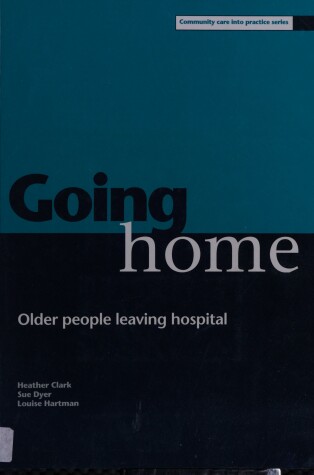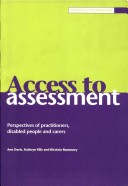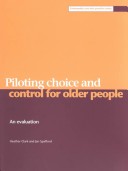Community Care into Practice
5 total works
This report focuses upon the value older people give to low-level services such as help with housework, gardening, home maintenance, and safety and security. It highlights the extent to which these services promote older people's ability to look after themselves and maintain their independence and shows that older people give a higher value to help than they do to care, which they often view as a threat to their independence. The older people saw these low-level services as preventing the need for care.The authors argue that older women's public and private identities are often closely linked to the appearance of their home and that domestic help is important in combating social exclusion and isolation. Older people's definitions of independence are shown to vary in line with changing capacities, energy levels and other circumstances. The case is made for a more dynamic and flexible service response to meet changing needs.The report is based on interviews with older people using various schemes providing 'help' and 'care', and with service providers. It concludes that if 'best value' is to be based on more than short-term fiscal considerations, policy makers need to consider those things which are important to the older people themselves and which will help them continue to live as independently as possible.
This report examines the experiences of older people being discharged from hospital, especially those needing housing adaptations and/or special equipment. It raises a number of key problems with the current system for needs assessment, including the "home visit" procedure with occupational therapists, where the needs of older people leaving hospital are assessed.
Access to Assessment
by Ann Davis, etc., Kathryn Ellis, and Kirstein Rummery
Published 1 December 1997
New regulations, which came into force in February 2000, have empowered local authorities in England to extend the scope of the 1996 Community Care (Direct Payments) Act to older people. This timely report is based on an evaluation of an innovative pilot scheme finding new ways to deliver services to older people, giving them greater choice and control. The scheme provides a model for other local authorities wanting to find ways to change care management and implement Direct Payments for older service users. Based on interviews held with older users and care managers involved in the pilot scheme, "Piloting choice and control for older people":examines issues around empowering informal carers; looks at older people's perceptions of the pilot scheme and their definitions of quality services; concludes with suggestions for positive change in provider organisations and the culture of care management; draws out broader lessons for service delivery and those applicable to the introduction of Direct Payments for older people.
The report is aimed at managers and front-line workers in all departments and agencies involved in the provision of services for older people, as well as policy makers, researchers and anyone interested in community care, older people and service user empowerment. This report is based on an evaluation of an innovative pilot scheme finding new ways to deliver services to older people, giving them greater choice and control. The scheme provides a model for other local authorities wanting to find ways to change care management and implement Direct Payments for older service users.
The report is aimed at managers and front-line workers in all departments and agencies involved in the provision of services for older people, as well as policy makers, researchers and anyone interested in community care, older people and service user empowerment. This report is based on an evaluation of an innovative pilot scheme finding new ways to deliver services to older people, giving them greater choice and control. The scheme provides a model for other local authorities wanting to find ways to change care management and implement Direct Payments for older service users.



